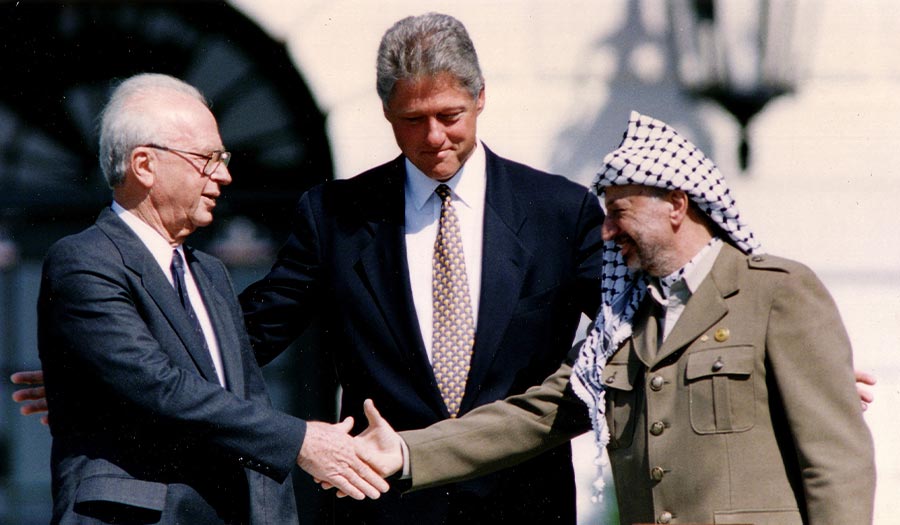 REUTERS/Gary Hershorn
REUTERS/Gary Hershorn
World News Desk
Learn the why behind the headlines.
Subscribe to the Real Truth for FREE news and analysis.
Subscribe NowJERUSALEM (Reuters) – Across the occupied West Bank, concrete checkpoints, separation walls and soldiers are reminders of the failure to build peace between Israelis and Palestinians since the historic Oslo Accords were signed 30 years ago this week.
The accord, intended as a temporary measure to build confidence and create space for a permanent peace agreement, has long since frozen into a system for managing a conflict with no apparent end in sight.
With the West Bank in turmoil, a nationalist government in Israel that dismisses any prospect of Palestinian statehood, and the Islamist movement Hamas flexing its muscles outside its home in Gaza, prospects for peace appear as distant as they ever have been.
Once the 87-year-old Palestinian President Mahmoud Abbas departs, a void will be left that may bring the crisis to a head.
“We are at the end of an era both in Palestine and Israel and probably in the region as a whole,” said Hanan Ashrawi, a civil activist and former spokesperson for the Palestinian delegation to the peace process in the 1990s.
“That whole generation—that era of talking about mutual recognition, two states, negotiated settlement, peaceful resolution—that’s coming to an end in Palestine,” she said.
Few on either side believe there is any realistic prospect of a two-state solution, with an independent Palestine existing side by side with Israel. The idea is now just a “convenient fiction,” Ms. Ashrawi added.
With barriers keeping the two sides apart in the West Bank, largely under Israeli military control, young Israelis and Palestinians have grown up knowing little of each other since the first agreement was signed on September 13, 1993.
“Oslo and I were born the same year,” said Mohannad Qafesha, a legal activist in the southern city of Hebron. “To me, I was born and there were checkpoints around me, around our house, if I leave home and go to the city to visit my friends, I would have to cross a checkpoint.”
According to United Nations figures some 700,000 Jewish settlers are now established across the West Bank and East Jerusalem, the core of any future Palestinian state, and settlement building is moving ahead rapidly. An estimated 3.2 million Palestinians live in the West Bank and 2.2 million in Gaza.
Violence over the past 18 months has seen dozens of Israelis, including civilians and soldiers, killed in attacks by Palestinians in the West Bank and Israel, and brazen attacks by Jewish settlers on Palestinian towns and villages.
Near-daily raids by Israeli forces have killed hundreds of Palestinian fighters and numerous civilians, while an array of new militant groups has emerged in towns like Jenin and Nablus with little connection to the older generation of Palestinian leaders.
“I have never seen the West Bank as it is at the moment ever, I have been in and out of here for almost 30 years and I haven’t seen it worse,” UN Special Coordinator Tor Wennesland said at a conference this week.
The structures created by the Oslo Accords nonetheless remain in place as the main framework for relations between Israelis and Palestinians in the absence of anything better.
The Palestinian Authority remains Israel’s favored, if often mistrusted, partner, though it lost control of Gaza when Hamas broke away in 2007. But dependent on foreign funds, with no electoral mandate and unpopular among its own people, it is caught between its roles as representative of the Palestinians and interlocutor with Israel.
“It’s very weak, it’s very poor but this agreement still exists,” said Michael Milshtein, a former official for COGAT, the Israeli military body set up after Oslo to coordinate between Israel and the newly created PA.
Temporary
The accords’ signing brought in a brief period of optimism, symbolized by the image of Palestinian leader Yasser Arafat and Israeli Prime Minister Yitzhak Rabin, watched over by U.S. President Bill Clinton, shaking hands on the White House lawn. Mr. Rabin was assassinated by an Israeli in 1995, while Mr. Arafat died in 2004.
For Yossi Beilin, a former justice minister and Israeli negotiator, the accords’ failure to bring peace came about because successive Israeli governments preferred to turn what was originally a temporary truce into a permanent status quo.
With Israeli society riven by the dispute over Prime Minister Benjamin Netanyahu’s bid to curb the power of the Supreme Court, prospects of any concerted peace effort appear remote.
“The current government in Israel doesn’t show any signs of willingness to go for a permanent agreement. So, those who speak about a permanent agreement will have to speak about future governments,” said Mr. Beilin, a former Labour Party politician.
Israeli officials fear that once Mr. Abbas goes, the door will be open either to a push by Hamas into the West Bank, where it is increasingly active, or to anarchy as rivals for the leadership fight it out.
But while several on the Israeli government side have spoken openly about annexing the West Bank entirely, the practical difficulties of such a move have proved prohibitive.
Already Palestinians, and a number of international human rights organizations, accuse Israel of operating an apartheid system in the West Bank.
Israel and its allies including the United States reject that charge, but annexation would force it to find a way between giving Palestinians a status equivalent to Israelis that would alter Israel’s character as a Jewish state or assigning them a separate status incompatible with a democracy.
“We’re both here and we are both here to stay,” said 29 year-old Rotem Oreg, of the liberal think tank the Israeli Democratic Alliance.
“So we need to figure out a way, one, to stay in the same land, two, without killing each other, and three, while maintaining a Jewish democratic state.”
- Real Truth Magazine Articles
- MIDDLE EAST
 Israel at 75
Israel at 75


